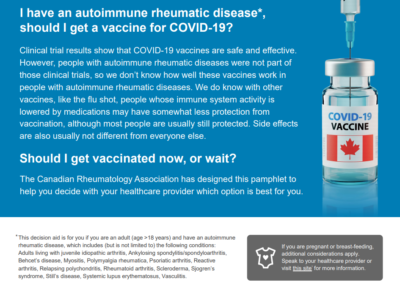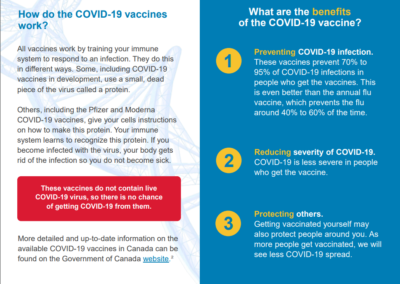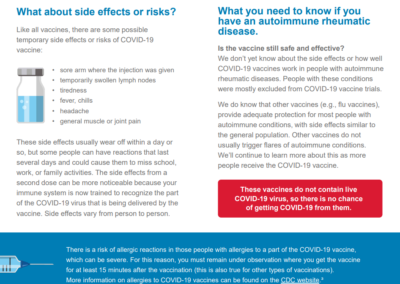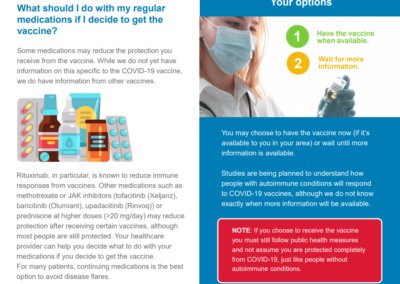Arthritis Patients Patiently Await COVID-19 Vaccine
Samantha Rogers has lived with inflammatory arthritis for almost two decades. Diagnosed with juvenile idiopathic arthritis at age 11, she is used to weighing the health risks of her daily activities. So when the pandemic hit, unlike many others, she saw a silver lining.
“My entire world, for the most part, now exists in my apartment. I live, work, go to school and volunteer from my desk. My life is a lot less social, but health-wise, there are advantages,” said the co-chair of Arthritis Research Canada’s Arthritis Patient Advisory Board.
Rogers explains how she has replaced commuting with walking, running and other outdoor physical activities, which play an important role in managing her disease.
“I have the flexibility of being at home, so I am better able to manage my arthritis,” she said.

Initially Rogers felt that, as long as her family and friends were safe and healthy, she could see the positives of the lifestyle changes brought about by the pandemic. However, by the time the Christmas holidays rolled around, she felt pretty tired of the social restrictions and not seeing loved ones.
Vaccine Hope
Rogers now eagerly, but patiently, awaits her turn for the COVID-19 vaccine.
“I will wait patiently for my vaccine, but I would love my turn and everyone’s turn to be here right now,” she said.
For her, it’s not just about being immunocompromised, it’s about protecting the people she loves. Rogers’ father is in his late seventies and she feels anxious about the possibility of her parents getting COVID-19. For the most part, though, research has calmed her initial worries about the impact of the virus on people like herself with compromised immune systems.
“If I could get the vaccine tomorrow, it would ease that sense of worry for myself, but also about passing the coronavirus on to loved ones,” Rogers said. “I don’t have concerns about how it would affect my arthritis. I think I would just mentally be relieved.”
Different Patient; Different Risk
However, as a patient involved in arthritis research, Rogers emphasizes that everyone has unique risks when it comes to COVID-19 and the vaccines. She lists complicating factors like age, weight, cardiovascular conditions, asthma and more.
“Even though I have an autoimmune disease, I’m otherwise very healthy,” Rogers said. “I think it is important to have discussions with your healthcare team before making a decision. If you are worried about the vaccine, talk to your rheumatologist.”
The Canadian Rheumatology Association’s official stance on COVID-19 vaccines is that “Individuals deemed eligible by Health Canada prioritization to receive the COVID-19 vaccine and who have an autoimmune rheumatic disease, or are immunosuppressed due to treatment, should receive the vaccine.” For more details about the CRA’s stance, please click here.
On the Fence?
The Canadian Rheumatology Association, under the leadership of Arthritis Research Canada’s Dr. Glen Hazlewood and with input from the Canadian Arthritis Patient Alliance (CAPA), has developed a “Decision Aid for the COVID-19 Vaccine in Patients with Autoimmune Rheumatic Diseases.”
This resource was created to help people living with autoimmune rheumatic diseases to work with their healthcare providers to decide on the vaccine option that works best for them. Click through the images below to view this helpful resource.


























































